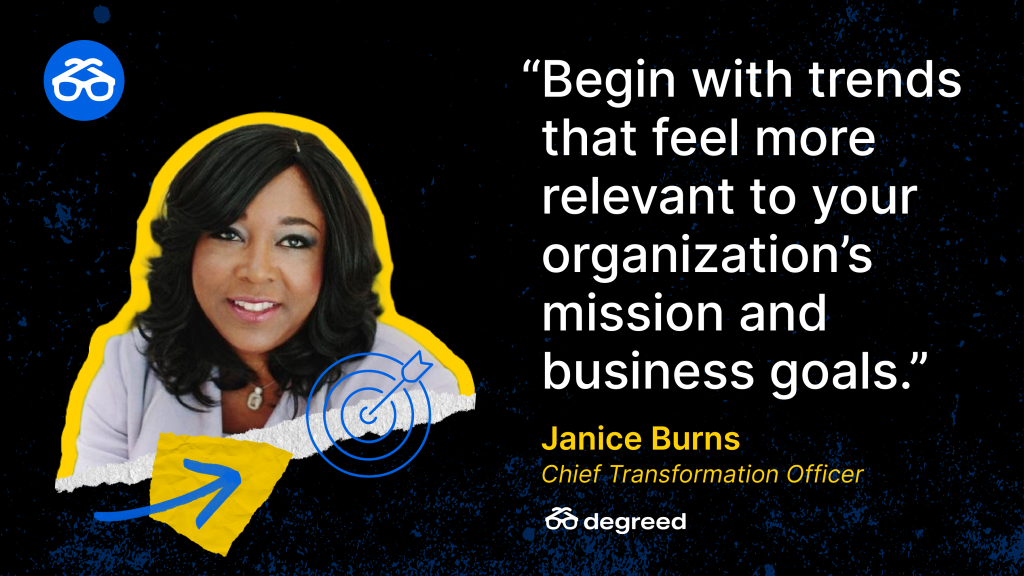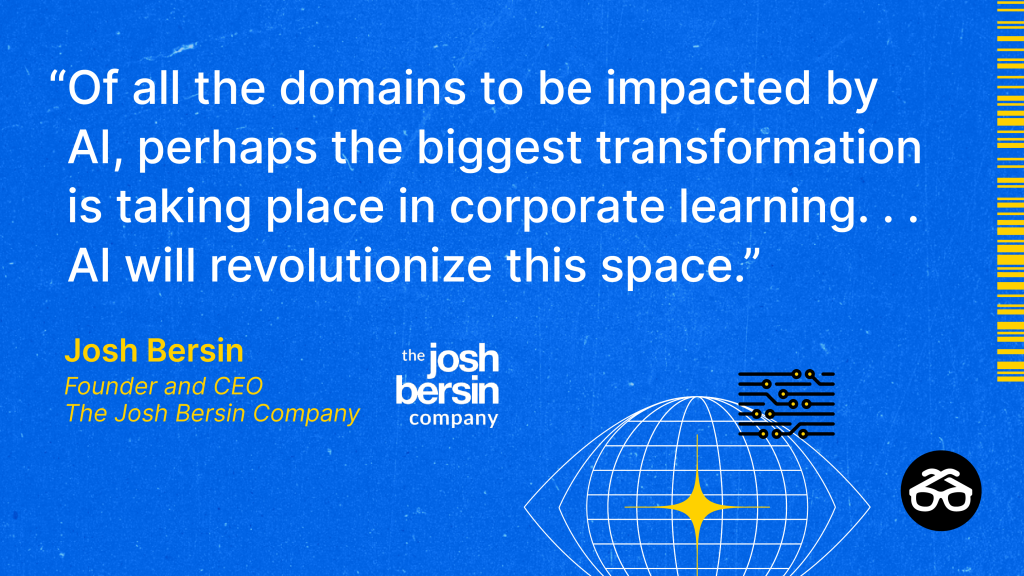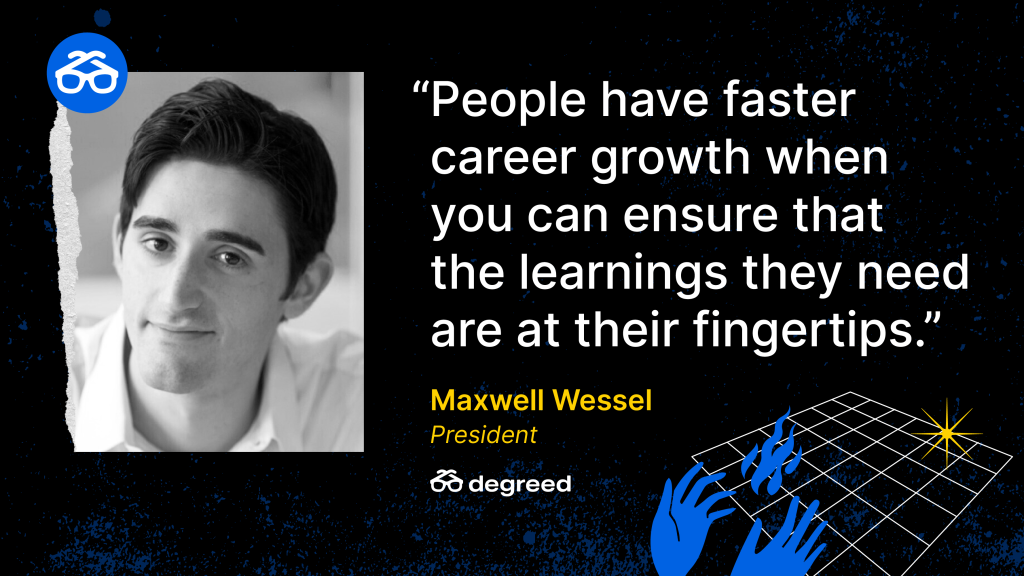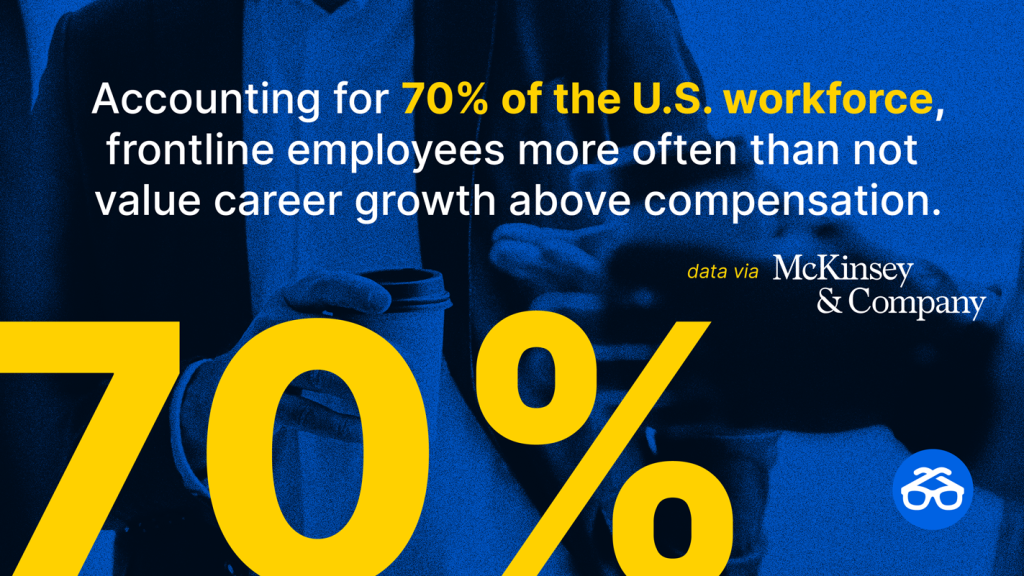Every revolution, poet Ralph Waldo Emerson said, begins as a single thought. When that same thought repeats, capturing the imaginations of more than one thinker, “it is the key to that era.”
From obtaining stakeholder buy-in and boosting end-user adoption to realizing the revolutionary skills-first business model of the future, the success of L&D programs swings hugely on the ability of learning leaders to understand and embrace today’s shifts, trends, and advancements.
“Begin with trends that feel more relevant to your organization’s mission and business goals,” advises Janice Burns, Degreed Chief Transformation Officer. “Become knowledgeable about them—and don’t be tempted to boil the ocean.”
With a finger to the wind and our eyes on the tides, let’s explore what’s hot and what’s not in L&D as 2024 barrels forward. While by no means is ours an exhaustive list, it’s certainly a helpful primer on ideas you can hold near and dear (or not!) as you swipe left or right on upcoming L&D strategy decisions.

What’s hot? Artificial intelligence.
To the surprise of probably no one, generative AI has been a consistently massive tech and business topic since ChatGPT burst into the zeitgeist in late 2022. You might be tempted to think AI will mostly impact computer programming, visual arts, or the act of writing an email. But there’s an argument that L&D will experience outsized change.
“Of all the domains to be impacted by AI, perhaps the biggest transformation is taking place in corporate learning,” according to analyst Josh Bersin, Founder and CEO of The Josh Bersin Company. “It’s now clear that AI will revolutionize this space.”
How? By generating content (and dramatically reducing the time and complexity involved), by personalizing the learner experience ( understanding the details of content, tailoring learning paths to individual needs, and improving their delivery), by identifying and developing skills (inferring the capabilities of individuals and delivering the right training), and by replacing training with knowledge tools (creating and deploying intelligent agents or chatbots that provide information and solve problems), according to Bersin.

What’s not hot? Carelessly embracing AI.
In a recent survey, AI dominated the list of hot trends impacting L&D, capturing an unprecedented 21.5% of the vote. That study, the 2024 Learning and Development Global Sentiment Survey, polled more than 3,200 L&D professionals in 97 countries.
While AI topped the Global Sentiment hot trends list, it also topped the survey’s list of L&D challenges in 2024.
“You read that right,” noted Donald H. Taylor, survey lead researcher. “AI is both respondents’ hottest trend and their greatest concern for the coming year.”
Attitudes vary from company to company, of course. Concerned business leaders are particularly wary about a lack of regulation, the costs of AI, ethical questions linked to the technology, and the challenge of building the skills needed to use AI effectively.Savvy learning leaders will likely view that last item as an opportunity as they look to drive business impact by upskilling workers in critical areas. At the same time, those learning leaders increasingly will be tasked with understanding how to ethically, securely, and cost-effectively incorporate AI into L&D platforms.
What’s hot? Building skills, skills, skills through collaborative experiences.
You recently might have heard the terms cohort learning experience or learning academies. Maybe you’re already deep into building one. Academies, according to Bersin, are the “next big step in corporate learning.” Why? They promise a solution to a problem that billions of dollars spent so far haven’t solved: managing and closing the ever-widening global skills gap.
A learning academy is a collaborative place where employees develop deep skills that align with business needs, often in groups or cohorts. Champions of academies think big, and they understand that deep upskilling is a different critical learning need than training or everyday learning. Deep upskilling requires a richer, longer, and more intensive learning experience.
In addition to providing employees with a social dynamic of learning from peers and subject matter experts lends context, sparks discussions, and offers coaching and feedback, academies can help organizations reduce costs, boost retention and engagement, and provide dexterity for a future in which people will be continually upskilling and re-skilling.
What’s not hot? Top-down learning.
People embrace relevant, custom learning experiences that will set them up for success. The likelihood of this happening increases when people are engaged with learning options and content they’re free to manage and consume on their own versus centralized, mandated training cascaded down from on high.
Forces fueling interest in decentralized alternatives to traditional higher education are also hard at work influencing businesses. The premise? Workforce development is more effective and impactful when employees are engaged with learning that’s important to not only their specific roles but also their immediate individual needs as well as their long-term personal goals.
As Degreed President Maxwell Wessel recently noted, “People have faster career growth when you can ensure that the learnings they need are at their fingertips. . . In a skills-based organization, it’s a lot easier to target individuals with relevant content and keep them up to speed than to ask them to learn everything the average person in their role needs.”

What’s hot? Democratized learning focused on front-line populations.
The global market for training frontline workers will likely double to more than $46 billion by 2028, according to a recent report by the management consulting firm MarketsandMarkets.
Benefits of engaging deskless employees include fewer accidents and injuries, higher customer satisfaction, reduced turnover, operational agility, and higher morale, according to the report.
Accounting for 70% of the U.S. workforce, frontline employees—such as retail, hospitality, and healthcare workers—more often than not value career growth above compensation, according to industry analysts at McKinsey & Co.
Deskless workers tend to be highly skilled, often work with their hands, and typically need to adhere to strict compliance regulations. And because they’re not at a computer all day, it’s sometimes harder for them to be trained in traditional ways.
Access to learning is key. It’s important that frontline workers feel part of the team, even if they’re not in contact with their deskbound coworkers on a daily basis. To democratize frontline worker learning and reap its benefits, ensure employees have easy access to learning resources across all career stages.

What’s not hot? Learning programs focused only on desk- or knowledge-workers.
If democratized learning is key to reaching frontline workers, then naturally that means moving beyond pervasive L&D strategies and programs focused on office workers. But how? Let’s take a closer look.
Start with online and mobile learning options; video courses, podcasts, and in general any type of bite-size content can make learning easier for workers in the field or on the go.
When Ecopetrol, a Colombian national oil and gas company, implemented new learning experiences, a new learning mindset was instilled in all levels of workers. During a six-month stretch, people completed 440,000 learning items. Learning leaders were surprised to find some of the biggest early adopters were people in operations and maintenance roles, not desk jobs. This engagement outpaced anything L&D had expected.
Encouraging workers to learn on their own is as important as democratizing access to available tools and resources. When people can learn in ways that work for them and set their own goals, they become the protagonists of their own development stories.
Ready to learn more?
Are your 2024 L&D programs inspired and wired or tired? See our report How the Workforce Learns to find out how you can use learning to drive business impact.

